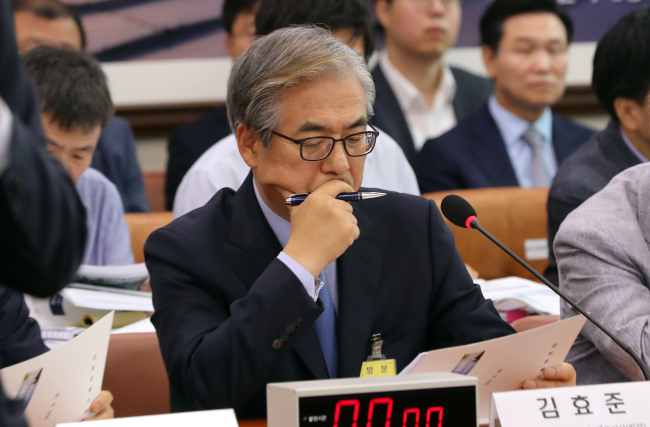BMW Korea chief says he will consider halting sales of fire-prone models
Transport Ministry to complete investigation into cause of engine fires by year-end
By Kim Bo-gyungPublished : Aug. 28, 2018 - 15:45
As confusion surrounding BMW vehicle fires continues, BMW Korea Chairman Kim Hyo-joon said Tuesday that he would look into halting sales of fire-prone BMW models until the investigation into the cause of the engine fires is completed.
His remarks were made during a hearing at the National Assembly, where members of the Land, Infrastructure & Transport Committee grilled Kim and questioned five experts involved in the BMW incidents, including Transport Vice Minister Kim Jeong-yeol.
Chairman Kim said he would look into halting sales of models recalled over the risk of fire in response to Rep. Kang Hoon-sik of the ruling Democratic Party, who urged Kim to provide answers instead of just an apology and to take action as the local chief of the company.
During the hearing, Vice Minister Kim said an investigative team would find out what had caused the engine fires as well as recall some 106,000 units. The ministry has drawn flak for its late response to the engine fires.
His remarks were made during a hearing at the National Assembly, where members of the Land, Infrastructure & Transport Committee grilled Kim and questioned five experts involved in the BMW incidents, including Transport Vice Minister Kim Jeong-yeol.
Chairman Kim said he would look into halting sales of models recalled over the risk of fire in response to Rep. Kang Hoon-sik of the ruling Democratic Party, who urged Kim to provide answers instead of just an apology and to take action as the local chief of the company.
During the hearing, Vice Minister Kim said an investigative team would find out what had caused the engine fires as well as recall some 106,000 units. The ministry has drawn flak for its late response to the engine fires.

“The investigative team will look into all possibilities raised besides the faulty exhaust gas recirculation cited by the carmaker, and focus on completing its investigation of the BMW car fires by the end of the year,” Vice Minister Kim said.
Kim added the government would revamp the current recall system to ensure that carmakers promptly issue recalls, and put into effect stronger legal measures, such as a punitive damages system, to ensure drivers’ safety and that carmakers take a pre-emptive approach.
In the wake of the BMW engine fires, the ministry has introduced the lemon law with stricter recall guidelines. It has also introduced harsher punishment for carmakers that intentionally delay recalls.
BMW Korea issued voluntarily recalls for some 106,000 units across 42 diesel models over the defective EGR with a risk of fire in late July.
According to the ministry, the 520d sedan that sparked the incidents account for about half of the 40 BMW cars that have caught fire so far this year.
Chairman Kim was also questioned on the test results of the Korea Consumer Association, which raised the possibility of a software error as the cause of the fires.
The KCA said in a press briefing Tuesday that BMW had set the electronic control unit, which controls the bypass valve, so that the valve would open at higher than average temperature for higher fuel economy and meet Euro 6 emissions standards.
Addressing the issue the BMW Korea chief said “Questions regarding the bypass valve have been around for a while, so I asked the German headquarters the same questions -- if it is related to the software. And the headquarters said multiple times that the bypass valve is not related to the EGR.”
In a test the KCA conducted on three models subject to the recall -- model year 2014 320 Touring, 520d and 320d -- the bypass valves reportedly opened frequently when the coolant temperature was between 80 and 100 degrees Celsius at high speeds.
This is higher than the temperature in the BMW manual that says, “The bypass of the EGR cooling is opened during EGR operation if the coolant temperature is lower than 50 degrees Celsius.”
According to automotive professor Lee Ho-geun, who participated in the test, the bypass valve is efficient in lowering emissions and increasing fuel economy, but raises chances of fire.
By Kim Bo-gyung (lisakim425@heraldcorp.com)








![[Graphic News] More Koreans say they plan long-distance trips this year](http://res.heraldm.com/phpwas/restmb_idxmake.php?idx=644&simg=/content/image/2024/04/17/20240417050828_0.gif&u=)
![[KH Explains] Hyundai's full hybrid edge to pay off amid slow transition to pure EVs](http://res.heraldm.com/phpwas/restmb_idxmake.php?idx=644&simg=/content/image/2024/04/18/20240418050645_0.jpg&u=20240419100350)







![[KH Explains] Hyundai's full hybrid edge to pay off amid slow transition to pure EVs](http://res.heraldm.com/phpwas/restmb_idxmake.php?idx=652&simg=/content/image/2024/04/18/20240418050645_0.jpg&u=20240419100350)

![[Today’s K-pop] Illit drops debut single remix](http://res.heraldm.com/phpwas/restmb_idxmake.php?idx=642&simg=/content/image/2024/04/19/20240419050612_0.jpg&u=)